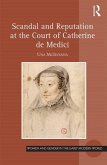- Gebundenes Buch
- Merkliste
- Auf die Merkliste
- Bewerten Bewerten
- Teilen
- Produkt teilen
- Produkterinnerung
- Produkterinnerung
Singing the News is the first study to concentrate on sixteenth-century ballads, when there was no regular and reliable alternative means of finding out news and information.
Andere Kunden interessierten sich auch für
![The Shakespeare Multiverse The Shakespeare Multiverse]() Valerie M. FazelThe Shakespeare Multiverse167,99 €
Valerie M. FazelThe Shakespeare Multiverse167,99 €![The Tragic Histories of Mary Queen of Scots, 1560-1690 The Tragic Histories of Mary Queen of Scots, 1560-1690]() John D. StainesThe Tragic Histories of Mary Queen of Scots, 1560-1690186,99 €
John D. StainesThe Tragic Histories of Mary Queen of Scots, 1560-1690186,99 €![Beyond the Sound Barrier Beyond the Sound Barrier]() Kristin K HensonBeyond the Sound Barrier171,99 €
Kristin K HensonBeyond the Sound Barrier171,99 €![Scandal and Reputation at the Court of Catherine de Medici Scandal and Reputation at the Court of Catherine de Medici]() Una McIlvennaScandal and Reputation at the Court of Catherine de Medici180,99 €
Una McIlvennaScandal and Reputation at the Court of Catherine de Medici180,99 €![Beckett the Playwright Beckett the Playwright]() John FletcherBeckett the Playwright112,99 €
John FletcherBeckett the Playwright112,99 €![The Routledge Concise History of Canadian Literature The Routledge Concise History of Canadian Literature]() Richard J. LaneThe Routledge Concise History of Canadian Literature170,99 €
Richard J. LaneThe Routledge Concise History of Canadian Literature170,99 €![A.C. Swinburne and the Singing Word A.C. Swinburne and the Singing Word]() A.C. Swinburne and the Singing Word113,99 €
A.C. Swinburne and the Singing Word113,99 €-
-
-
Singing the News is the first study to concentrate on sixteenth-century ballads, when there was no regular and reliable alternative means of finding out news and information.
Produktdetails
- Produktdetails
- Verlag: Routledge
- Seitenzahl: 282
- Erscheinungstermin: 20. Februar 2018
- Englisch
- Abmessung: 235mm x 157mm x 20mm
- Gewicht: 563g
- ISBN-13: 9781138553477
- ISBN-10: 1138553476
- Artikelnr.: 51284738
- Herstellerkennzeichnung
- Libri GmbH
- Europaallee 1
- 36244 Bad Hersfeld
- gpsr@libri.de
- Verlag: Routledge
- Seitenzahl: 282
- Erscheinungstermin: 20. Februar 2018
- Englisch
- Abmessung: 235mm x 157mm x 20mm
- Gewicht: 563g
- ISBN-13: 9781138553477
- ISBN-10: 1138553476
- Artikelnr.: 51284738
- Herstellerkennzeichnung
- Libri GmbH
- Europaallee 1
- 36244 Bad Hersfeld
- gpsr@libri.de
Jenni Hyde is Associate Vice-President of the Historical Association. A former music teacher, folk singer and classically-trained soprano, she holds a doctorate in history from the University of Manchester and a PGCE in music from Edge Hill University College. She is Honorary Researcher in History at Lancaster University and an Associate Lecturer at Liverpool Hope University. She has published articles for both journals and popular magazines.
List of Tables
List of Figures
Abbreviations
Acknowledgements
Editorial Note
A Note on Musical Analysis
Chapter 1 Introduction - now lesten a whyle & let hus singe
Chapter 2 'Lend listning eares a while to me' - the production and
consumption of sixteenth-century ballads
Chapter 3 'I praye thee mynstrell make no stoppe' - the music of the
mid-Tudor ballads
Chapter 4 'Sung to filthy tunes' - the meaning of music
Chapter 5 'Ye never herd so many newes' - the social circulation of
information in ballads
Chapter 6 'Of popyshnes and heresye' - political ballads and the fall of
Thomas Cromwell
Chapter 7 'Lyege lady and queene' - discourses of obedience in the reign of
Mary I
Chapter 8 'Some good man, for the commons speake' - scribal collections and
social criticism
Conclusion 'one hundred of ballits'
Bibliography
List of Figures
Abbreviations
Acknowledgements
Editorial Note
A Note on Musical Analysis
Chapter 1 Introduction - now lesten a whyle & let hus singe
Chapter 2 'Lend listning eares a while to me' - the production and
consumption of sixteenth-century ballads
Chapter 3 'I praye thee mynstrell make no stoppe' - the music of the
mid-Tudor ballads
Chapter 4 'Sung to filthy tunes' - the meaning of music
Chapter 5 'Ye never herd so many newes' - the social circulation of
information in ballads
Chapter 6 'Of popyshnes and heresye' - political ballads and the fall of
Thomas Cromwell
Chapter 7 'Lyege lady and queene' - discourses of obedience in the reign of
Mary I
Chapter 8 'Some good man, for the commons speake' - scribal collections and
social criticism
Conclusion 'one hundred of ballits'
Bibliography
List of Tables
List of Figures
Abbreviations
Acknowledgements
Editorial Note
A Note on Musical Analysis
Chapter 1 Introduction - now lesten a whyle & let hus singe
Chapter 2 'Lend listning eares a while to me' - the production and consumption of sixteenth-century ballads
Chapter 3 'I praye thee mynstrell make no stoppe' - the music of the mid-Tudor ballads
Chapter 4 'Sung to filthy tunes' - the meaning of music
Chapter 5 'Ye never herd so many newes' - the social circulation of information in ballads
Chapter 6 'Of popyshnes and heresye' - political ballads and the fall of Thomas Cromwell
Chapter 7 'Lyege lady and queene' - discourses of obedience in the reign of Mary I
Chapter 8 'Some good man, for the commons speake' - scribal collections and social criticism
Conclusion 'one hundred of ballits'
Bibliography
List of Figures
Abbreviations
Acknowledgements
Editorial Note
A Note on Musical Analysis
Chapter 1 Introduction - now lesten a whyle & let hus singe
Chapter 2 'Lend listning eares a while to me' - the production and consumption of sixteenth-century ballads
Chapter 3 'I praye thee mynstrell make no stoppe' - the music of the mid-Tudor ballads
Chapter 4 'Sung to filthy tunes' - the meaning of music
Chapter 5 'Ye never herd so many newes' - the social circulation of information in ballads
Chapter 6 'Of popyshnes and heresye' - political ballads and the fall of Thomas Cromwell
Chapter 7 'Lyege lady and queene' - discourses of obedience in the reign of Mary I
Chapter 8 'Some good man, for the commons speake' - scribal collections and social criticism
Conclusion 'one hundred of ballits'
Bibliography
List of Tables
List of Figures
Abbreviations
Acknowledgements
Editorial Note
A Note on Musical Analysis
Chapter 1 Introduction - now lesten a whyle & let hus singe
Chapter 2 'Lend listning eares a while to me' - the production and
consumption of sixteenth-century ballads
Chapter 3 'I praye thee mynstrell make no stoppe' - the music of the
mid-Tudor ballads
Chapter 4 'Sung to filthy tunes' - the meaning of music
Chapter 5 'Ye never herd so many newes' - the social circulation of
information in ballads
Chapter 6 'Of popyshnes and heresye' - political ballads and the fall of
Thomas Cromwell
Chapter 7 'Lyege lady and queene' - discourses of obedience in the reign of
Mary I
Chapter 8 'Some good man, for the commons speake' - scribal collections and
social criticism
Conclusion 'one hundred of ballits'
Bibliography
List of Figures
Abbreviations
Acknowledgements
Editorial Note
A Note on Musical Analysis
Chapter 1 Introduction - now lesten a whyle & let hus singe
Chapter 2 'Lend listning eares a while to me' - the production and
consumption of sixteenth-century ballads
Chapter 3 'I praye thee mynstrell make no stoppe' - the music of the
mid-Tudor ballads
Chapter 4 'Sung to filthy tunes' - the meaning of music
Chapter 5 'Ye never herd so many newes' - the social circulation of
information in ballads
Chapter 6 'Of popyshnes and heresye' - political ballads and the fall of
Thomas Cromwell
Chapter 7 'Lyege lady and queene' - discourses of obedience in the reign of
Mary I
Chapter 8 'Some good man, for the commons speake' - scribal collections and
social criticism
Conclusion 'one hundred of ballits'
Bibliography
List of Tables
List of Figures
Abbreviations
Acknowledgements
Editorial Note
A Note on Musical Analysis
Chapter 1 Introduction - now lesten a whyle & let hus singe
Chapter 2 'Lend listning eares a while to me' - the production and consumption of sixteenth-century ballads
Chapter 3 'I praye thee mynstrell make no stoppe' - the music of the mid-Tudor ballads
Chapter 4 'Sung to filthy tunes' - the meaning of music
Chapter 5 'Ye never herd so many newes' - the social circulation of information in ballads
Chapter 6 'Of popyshnes and heresye' - political ballads and the fall of Thomas Cromwell
Chapter 7 'Lyege lady and queene' - discourses of obedience in the reign of Mary I
Chapter 8 'Some good man, for the commons speake' - scribal collections and social criticism
Conclusion 'one hundred of ballits'
Bibliography
List of Figures
Abbreviations
Acknowledgements
Editorial Note
A Note on Musical Analysis
Chapter 1 Introduction - now lesten a whyle & let hus singe
Chapter 2 'Lend listning eares a while to me' - the production and consumption of sixteenth-century ballads
Chapter 3 'I praye thee mynstrell make no stoppe' - the music of the mid-Tudor ballads
Chapter 4 'Sung to filthy tunes' - the meaning of music
Chapter 5 'Ye never herd so many newes' - the social circulation of information in ballads
Chapter 6 'Of popyshnes and heresye' - political ballads and the fall of Thomas Cromwell
Chapter 7 'Lyege lady and queene' - discourses of obedience in the reign of Mary I
Chapter 8 'Some good man, for the commons speake' - scribal collections and social criticism
Conclusion 'one hundred of ballits'
Bibliography








